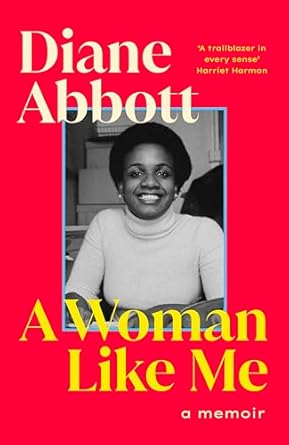A Woman Like Me by Diane Abbott (2024)
Memoir
Stephen
10/23/20243 min read
Towards the end of this autobiography, Diane Abbott concludes with a substantial section outlining her political views and commenting on the political scene in the 2020s. I was not the least surprised to find myself disagreeing with her about practically everything, and not just her policy positions, but the whole analysis which informs them and the assumptions on which they are based.
The entire memoir is infused on every page with a strident brand of identity politics which Diane was pursuing with vigour long before most people started engaging in such debates.
I consider her views to be extreme and flawed in many respects, particularly when she continually accuses those who disagree with her or criticise her as being motivated by racism and sexism.
Such people infuriate me as a rule, and we steer clear of one another. I am probably right in thinking that they hate me for what I am; someone categorised firmly as an item in Hilary Clinton's 'basket of deplorables'. And I sometimes find myself thinking pretty hateful things about them too. But I have always liked Diane Abbott and will invariably defend her when she is attacked by those who despise her views.
I remember listening live to her infamous 'car crash' interview with Nick Ferrari about police numbers on LBC when driving to work a few years ago and rooting for her with some passion, desperately wanting her to pull it back.
The reason for this admiration is partly her very affable weekly appearances with Michael Portillo on the Andrew Neil political discussion show during the Blair and Brown years in which she showed herself to be a thoughtful, reasonable and empathetic politician.
It is also, of course, because I am very aware of the appalling racist abuse that she gets all the time and her ability to carry on fighting her corner in spite of it. In this book she quotes from some of the repulsive letters she has received, and it is impossible not to get really angry on her behalf.
Like a lot of political memoirs this one suffers a touch from a lack of humility and I think she would benefit sometimes from pausing and trying to understand more the motives of people who disagree with her.
She is proud of fighting for her beliefs, including the pretty unpleasant episode involving the deselection of her predecessor as MP in Hackney, but she tends to get indignant when her opponents - typically labelled here as 'the right' - are equally ruthless in fighting for theirs'. And in this context she means 'the right' of the Labour Party, namely the ones who actually manage to win elections.
I really enjoyed this book despite the politics though. It is engagingly written and gives an original and completely authentic account of the past fifty years of British political from an insider perspective. But more importantly for me is the fact that when you strip out all the identity politics and point-scoring, you are left as a reader with a very inspiring tale of social mobility and personal accomplishment.
Diane Abbott, without any social advantage, purely through ability, application and tenacity, got herself educated, did some really interesting jobs, developed a passion for political activism, campaigned tirelessly and now finds herself 'Mother of the House' as the longest serving female MP in Parliament. It is a hell of an achievement and it is due to her dogged example and those of a handful of others that so much progress has been made.
As I write it is entirely possible that a black woman may be about to become Leader of the Opposition with a good shot at becoming Prime Minister at the next general election, and this does not seem especially remarkable.
Role models really matter and Diane Abbott's greatest triumph is to have been one of the most significant in the UK today.

